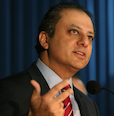
"We've been aggressive in using every aspect of the law that we can," including seeking forfeiture of pensions of convicted elected officials, U.S. Attorney Preet Bharara said in remarks at a Manhattan forum hosted by the Fordham Law Review.
"Public corruption is an important priority for us as any other area," he said. "And I think we're right to make it a high priority."
Unlike his pointed remarks following last month's announcement of bribery charges against then-Assembly Speaker Sheldon Silver, Bharara stuck to broad themes in a speech and question-and-answer session with law students. He advocated reforms that would make the political process more transparent and encourage whistleblowers to come forward.
"Anyone who denies the fact, or suggests that corruption is not a pervasive problem given the cases that have been brought in Albany, is off base," Bharara said. "And everyone who's in a position to do something about it bears a responsibility to cure the problem. That includes prosecutors and the public and the press and the politicians themselves."
Backroom bargaining in the legislature makes it difficult to determine whether corrupt politicians are casting a vote or rewriting a bill as part a quid pro quo, he said.
"If everything is done behind closed doors and budget items are added after the public process has happened, that makes it really hard for people in my office to prove those crimes," he said. "You can glean from that what you will in terms of rule changes."
Silver, 71, has pleaded not guilty to charges he received $4 million in kickbacks from law firms for doing political favors since 2002. The powerful Democrat's arrest roiled the state capital, where 28 legislators have stepped down because of criminal or ethical issues during the past 15 years.
In public comments after Silver's arrest, Bharara accused the lawmaker of practicing "the greedy art of secret self-reward." He also boasted that the case provided "the answer" for those who'd wondered how Silver made a fortune as a lawyer during decades as a legislator, and suggested Silver "sold his office to line his pockets and compromised his integrity and ethics."
Lawyers for Silver have argued that Bharara broke rules about what prosecutors can say outside court and may have prejudiced the grand jury that indicted their client. They characterized the prosecutor's rhetoric "as inflammatory, over-the-top language that targets not just Mr. Silver but the entire New York state government."
Bharara's office has defended his comments as appropriate. In court papers, it said the announcement of Silver's arrest made "abundantly clear the charges were allegations."